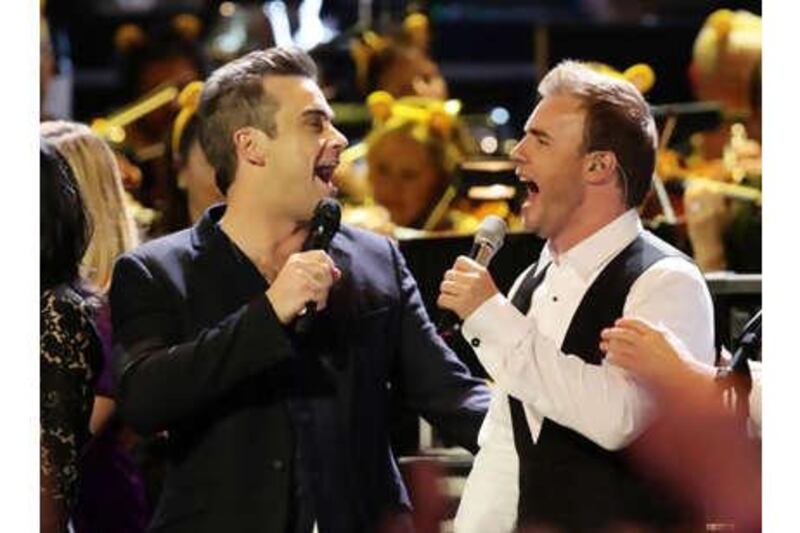Musical rivalries are woven into the very fabric of pop. Without them, there would only be boring bands playing tediously safe music. Keane, essentially. But knock musical heads together in a studio, leave the animosity to fester, and hey presto, you have some of the best songs of all time. After all, would The Beatles have notched up countless No 1s without McCartney and Lennon's increasingly aggravated games of creative one-upmanship? The Eagles may boast the best-selling-ever album in the US, but was it despite or because of the clashing egos that in the end led to the band telling a Long Beach audience just how they were going to beat each other up after the show? And then there's Oasis's Noel and Liam Gallagher, goading each other so adroitly that there's actually a CD of a famous argument. It's more entertaining than some of their later albums. Of course, such animosity ends in tears, break-ups and, in Oasis's case, a completely disgraceful "performance" at a festival last year.
And then there's the case of Take That. Back in 1995, Robbie Williams wanted to be cool. He wanted to be in Oasis, not a boy band, and his increasingly erratic behaviour drove Take That apart - although not before perhaps their finest moment: Williams singing Back For Good in the rain. And yet now they want to get back together again: hardly surprising but certainly odd. After all, Take That no longer needs that finely honed mix of arrogance and insecurity that earned Williams a one-way ticket out of the band in 1995.
After a 2005 television documentary that essentially made the entire United Kingdom feel sorry for Gary Barlow (Williams didn't turn up for the planned reunion), the remaining four in Take That realised that, incredibly, quite a lot of people liked them. They reformed and made two great albums, while Williams's career began to falter. This was trend-bucking stuff. In spite of the smattering of comebacks in the past couple of years, "don't go back" is the more common mantra for once-famous musicians who have fallen upon hard times, so "don't go back with one of your most famous members missing" has an even more desperate air about it. We refer you to The Faces with, er, Mick Hucknall as frontman in place of Rod Stewart.
But perhaps Take That need a frisson of danger, a gimmick, once more. And so Robbie Williams has finally been invited back into the fold. It's a gamble, though. Some bands are just not meant to reform; Morrissey and Johnny Marr disliked each other and stopped The Smiths before it impacted on the music. Ian Brown and John Squire ended the Stone Roses just when it was obvious that their star (and relationship) was waning. You wouldn't want them to try again.
Sometimes, then, the wounds are too deep. Roxy Music are playing a few festivals this summer and a sprinkling of dates in 2011, but Bryan Ferry will have to sing without Brian Eno on keyboards. Admittedly, Eno had agreed to work on some songs with his former bandmate this year, but the in-fighting that led to them splitting acrimoniously 37 years ago might not have been forgotten. They certainly aren't playing together this time around. In some respects, an Eno-less Roxy Music isn't the dealbreaker a Jagger-less Rolling Stones would be, because Ferry was the frontman and songwriter. Suede, too, managed just fine without the guitarist Bernard Butler when they played some live dates this year.
In fact, Brett Anderson reformed the band with Butler's blessing, and the two have worked on new music together. Quite a turnaround from the death throes of Suede, when Butler would travel separately and tell assembled journalists that Anderson was obsessed with being a rock star, at the expense of the music. But in the end, expecting our favourite acts to get on with each other is ridiculous. Egos, tour fatigue, boredom ... many things can go wrong in a band. Understand that, and you're halfway to success. As the Police drummer Stewart Copeland told The Guardian before their reunion tour in 2007: "There are times when Sting and I shake our heads at the disparity in our music values, and yet there are 60,000 people out there that want to hear us play together. How's that possible? We disagree so deeply and profoundly about fundamental pillars of our artistic philosophy that sometimes we look at each other and it's not just like we come from different planets, but that different rules of physics apply."
And therein lies the magic of being in a band, of why rivalries can actually work to the benefit of everyone. It's within different approaches and mindsets that great music is made. Although what exactly Robbie Williams will bring to the party, apart from being a bit cheeky on stage and probably causing a few rows, remains to be seen.





